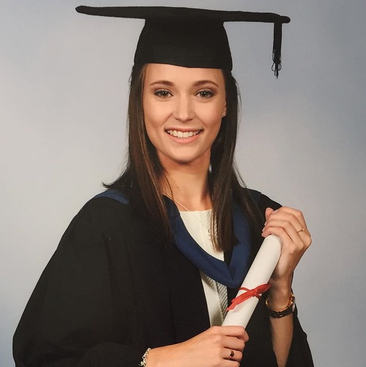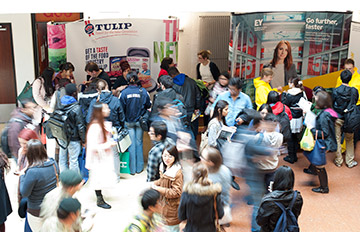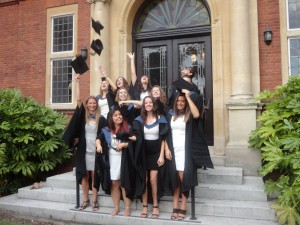We’re really proud of the work that our graduates do after they leave the Department of Modern Languages at University of Reading. In the coming months, we’ll feature stories from some of our former students in order to highlight the wide variety of careers that our alumni pursue. It’s clear that a degree in Modern Languages could be the key to a career that could take you anywhere in the world.

Joely Justice, 2015 Reading graduate
This month, we asked Joely Justice, who graduated in 2015 with a degree in French and Italian, to tell us about her new career in translation:
“I began studying Italian at the age of 14, at which point I’d already studied French for 2 years. From then onward I knew I wanted to pursue a career in languages, and more specifically in translation. After all that time, I still haven’t changed my mind. That’s what led me to apply for the job I’m doing today.
I work for the Eurofile department of RWS Group as an Intellectual Property Services Co-ordinator. The job is a project management role, and involves managing the process of the translation of European Patents into European languages, as well as the national validation of these translations in Europe. On a daily basis we process any new orders from our clients, send the documents to be translated out to freelance or to in-house translators and deal with any queries from either the translators or our clients.

Joely Justice, Intellectual Property Services Co-ordinator at the RWS Group
The best thing about this job is that I get to use my languages; I mainly use French as I deal with French clients and translators every day, which is great. I didn’t know I’d be able to be using my languages so much in my first job after graduating.
I found my job by signing up to receive emails from different websites. On applying for the job I went through an agency called Park Street People, which was really helpful as the lady I spoke to arranged everything for me and gave me advice for the interview. I was doing my final exams at the time, so it was a real help and a relief to have some guidance at such a stressful time!
During my final year, a representative from RWS came to a University of Reading Careers Fair, where several individuals from different companies came in and spoke to us about their companies and the kinds of careers we could pursue as a language graduate. Of course, since I have always wanted to work in translation, I was mainly interested in RWS Group. It was a great opportunity and I hadn’t realised before that I could do a project management role so soon after graduating.
The careers events that were put on were really helpful and it was inspiring to see how many different routes there are to follow with a language degree. It is especially beneficial if you’re not entirely sure what you want to do, as you

A University of Reading Careers Fair
can see all of the possible alternatives and explore your options. The University really helped by putting on these careers events.
I would definitely recommend going to as many of these events as you can during your time at Reading and to make the most of these opportunities, as they are always insightful and helpful whether you know exactly what you want to do or you’re undecided.
The support we receive from the Department of Modern Languages and European Studies at the University of Reading is amazing, not just academically but also on a personal level. Our lecturers were always passionate in their teaching and were always there to support and encourage us.
I found a job doing exactly what I wanted to do so soon after leaving university and I will always be grateful to the department and to the university for giving me the opportunities that they did.”
It’s wonderful to hear stories like Joely’s. They make clear that a degree in French, German, Italian, or Spanish at Reading offers promising career prospects in so many different fields .
If you’d like to find out more about a career with RWS, you can contact Joely at joelyjustice@hotmail.co.uk. To learn more about the many career opportunities for students of languages, be sure to follow our blog, like us on Facebook, and subscribe to our Twitter feed, so that you can keep up on all the news and events of the Department of Modern Languages and European Studies at the University of Reading.

Are you a University of Reading graduate? Be sure to keep in touch with us!
If you’re a Reading graduate, we’d love to hear from you about your career choices after university. Tell us your story. The University of Reading publishes alumni profiles online. If you’d like to share your experiences, all you have to do is fill out an online questionnaire.
When you do, please consider submitting your story for the “Meet a Reading Graduate” section of the blog of the Department of Modern Languages and European Studies.
If you’d like to tell us where your Reading degree has taken you, and perhaps to share a few memories of the department, please get in touch with our Alumni Officer, Dr Veronica Heath. And please consider joining the University’s Thrive Mentoring Scheme to help our students make their transition into the world after graduation so that you can help more students like Joely find a job doing exactly what they want to do.





![20160211_112131 copy[2]](https://blogs.reading.ac.uk/mles/files/2016/02/20160211_112131-copy2.jpg)
![20160211_112537 copy[2]](https://blogs.reading.ac.uk/mles/files/2016/02/20160211_112537-copy2.jpg)






